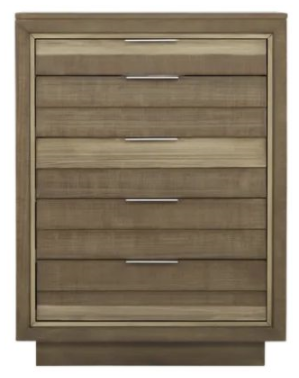As legislation that would help prevent dresser tip-overs sits stalled in the U.S. Senate for more than a year, another 1,380 dangerous dressers have been recalled.
On February 3, 2022, BFG North Carolina issued a joint recall with the Consumer Product Safety Commission (CPSC) for its River Street Five-Drawer Chests, stating that the chests do not comply with the furniture industry’s voluntary standard for safety and stability. According to the notice, the recalled chests are unstable if not wall-anchored and pose a tip-over and entrapment hazard that can result in death or serious injury to children.
The recalled chests were sold at Rooms To Go stores nationwide and online from February 2019 through October 2021 for about $600. They come in mocha and graphite colors and measure about 46.25 inches tall, 35.15 inches wide and 16.9 inches deep. A label affixed to the back reads “INDD 2425-6 CHEST,” “Made in Brazil,” SKU number 32624252 (mocha) or “INDD 423-6 CHEST,” “Made in Brazil,” SKU number 32624238 (graphite), with a manufacture date between December 2018 and October 2021.
The recall notice instructs consumers to immediately stop using the recalled chests and to contact Rooms To Go for a free in-home repair by trained technicians, free replacement, or a full refund of the purchase price in the form of a Rooms To Go store credit, including free pick-up of the chest.
The BFG North Carolina recall comes as the STURDY Act (Stop Tip-Overs of Unstable, Risky Dressers on Youth Act), which would require the CPSC to create a mandatory federal safety standard for dressers sold in the United States, has sat stalled in the Senate’s Committee on Commerce, Science and Transportation since February 25, 2021. The U.S. House of Representatives voted in June 2021 with bipartisan support to pass the STURDY Act.
If the Senate’s failure to act to protect kids from unsafe and unstable dressers sounds familiar, it is because the issue is déjà vu all over again. The bill marks the third attempt by lawmakers in recent years to strengthen the safety standard. In 2020 and 2019, similar legislation passed the House with bipartisan support, but unfortunately stalled in the Senate twice.
To be clear: Inaction by lawmakers will cost children their lives. The CPSC reports that between 2000 and 2020, 218 people died from tip-overs of chests, bureaus and dressers. Of the fatalities, 103 involved a television also falling, and 115 were furniture-only. Of the 115 furniture-only tip-overs fatalities, 87 involved children, 23 involved seniors and five involved adults. Tip-overs of chests, bureaus and dressers sent an estimated 2,400 children to U.S. hospital emergency rooms from 2018 to 2020, according to the CPSC.
Presently, the stability of dressers sold in the United States is governed by nothing more than a voluntary safety standard created primarily by the furniture industry along with other interested parties.
Daniel J. Mann, a partner and product liability attorney at Feldman Shepherd, noted that dresser tip-over accidents often occur when young children wake up and are alone in their bedroom. Mann said that curious toddlers may open dresser drawers to climb to the top or retrieve something in an upper drawer. As toddlers do not have the strength to catch a falling dresser or to lift one that has fallen on top of them, too often the outcome is catastrophic for the children and their families.
In response to the recall, Mann remarked while he “is pleased that BFG North Carolina is recalling its unsafe dressers, the epidemic of dresser tip-over injuries and deaths involving young children demands that lawmakers pass the STURDY Act immediately.”
Mann, along with Feldman Shepherd co-founding partner Alan M. Feldman and partner Edward S. Goldis, has recovered nearly $100 million on behalf of four families whose toddlers died from IKEA dresser tip-overs. In May 2020, the team filed a class action lawsuit against IKEA seeking consumer damages, alleging that the furniture giant carried out a “feeble” recall of nearly 30 million dressers that it knew were prone to tip-over. The IKEA dressers did not comply with voluntary safety standards and had caused death and serious injury to children.


